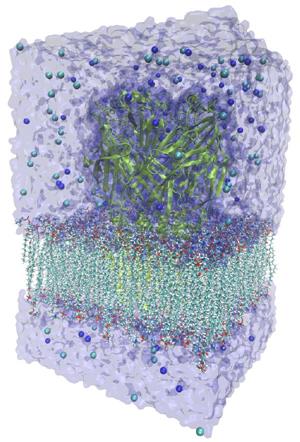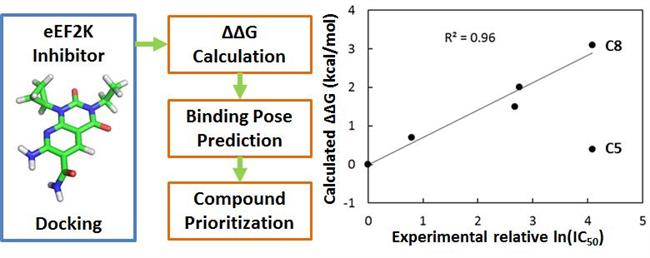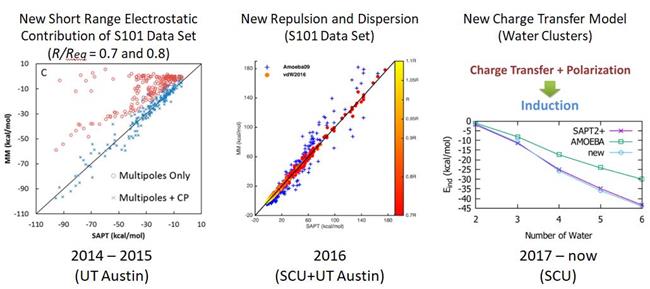王乾韬副教授,博士生导师 
联系方式
Email: qwang @ scu.edu.cn
课题组网站:https://www.wanglab-scu.com/
学历
2005-2009 英国曼彻斯特大学 药学院,博士(导师:Richard Bryce)
2002-2005 英国曼彻斯特大学 物理与天文学院,学士
工作经历
2017-至今 四川大学华西药学院,副教授 (兼任学院学科发展建设办公室主任)
2015-2017 四川大学 华西药学院,特聘副研究员
2012-2015 美国得州大学奥斯丁 药学院,博士后(导师: Kevin Dalby & Pengyu Ren)
2010-2012 美国罗格斯-新泽西州立大学BioMaps Institute,博士后(导师: David Case)
研究方向
(1)计算机辅助药物设计、分子动力学模拟:
利用GPU加速的自建高性能计算机集群对药物与受体、离子通道、激酶等大分子蛋白的结合过程、能量、结构等进行分子动力学模拟,实现对蛋白质结构在原子层面的动态观察与研究,并应用于药物设计中。
药物研发具有周期长、花费大的特点,因此目前的一个前沿研究方向即是通过计算机人工智能为辅助手段,解决药物设计中的痛点和难点问题。如:课题组与美国得州大学药学院Kevin Dalby教授合作,成功从300万个小分子中筛选得到了多个具有潜在抗肿瘤活性的小分子化合物,并在后期实验中验证;与四川大学华西药学院同事利用多学科交叉,成功探明了一类中药提取物的生物学靶点,并阐明了其增强学习记忆能力的药理作用机制等。

(2)抗神经退行性、抗肿瘤药物的发现与开发:
神经退行性疾病与肿瘤是影响国民健康的两大顽疾,具有极其巨大的临床需求及重要的社会经济意义。课题组通过计算化学、合成化学、化学生物学等手段致力于基于靶点的药物发现与设计(eEF2K, PERK, MELK, GABAAR, SK3等)、以及基于天然来源的药物分子的靶点寻找、机理研究及衍生物的设计与开发。

(3)理论方法及软件开发(AMBER, AMOEBA and etc.)
计算精度与计算速度的矛盾是目前现有分子模拟技术有一个极大的挑战。或者简单来讲,即:计算速度与计算准确度不可兼得的问题。课题组长期与美国分子模拟领域大师David Case及Pengyu Ren教授合作,参与了国际知名分子动力学模拟力场Amber与 AMOEBA的开发工作,并致力于新一代前沿可极化电荷转移分子力场模型的开发工作。

软件开发
(1)ParmOpt参数拟合软件(独立开发,Wang,Q.T. et al., 2015, J. Chem. Theory Comput., pp. 2609-2618)
(2)世界知名分子动力学模拟软件包Amber(参与开发,http://ambermd.org/)
(3)世界知名可极化分子力场模型AMOEBA力场(参与开发)
科研项目
2021-2024 分子间电荷转移的精确模拟及其对生物体系中二价金属与配体结合的影响, 国家自然科学基金面上项目
2019-2021 新型GABAA受体调节剂的设计、合成及其抗阿尔兹海默症的药效评价(省重),四川省科技计划项目
2017-2019 具有全新结构的三阴性乳腺癌新靶点eEF2K激酶抑制剂的设计、合成 及活性评价,国家自然科学基金青年科学基金项目
2015-2017 四川大学引进人才科研启动经费资助项目
发表论文
通讯作者(2016-2021):
(1) Yuan, X#; Zhang, D.#; Mao, S.*; Wang, Q.*, Filling the Gap in Understanding the Mechanism of GABAAR and Propofol Using Computational Approaches. Journal of Chemical Information and Modeling, 2021, 61(4), 1889-1901
(2) Zhang, J.; Mu, K.; Yang, P.; Feng, X.; Zhang, D.; Fan X.; Wang, Q.*; Mao, S.*, Synthesis, antiepileptic effects, and structure-activity relationships of α-asarone derivatives: In vitro and in vivo neuroprotective effect of selected derivatives. Bioorganic Chemistry, 2021, 115, 105179
(3) Dong, X.; Yuan, X.; Song, Z.; Wang, Q.*, The development of an Amber-compatible organosilane force field for drug-like small molecules. Physical Chemistry Chemical Physics, 2021, 23, 12582-12591
(4) Zhu, H.; Wang, W.; Li, Z.; Ma, D.; Lin, X.; Li, J.; Wang, Q.*, Ma, J.*, Calculation of Transport Parameters Using ab initio and AMOEBA Polarizable Force Field Methods. The Journal of Physical Chemistry A, 2021, 125(22), 4918-4927
(5) Chen, Y.#; Zheng, Y.#; Fong, P.; Mao, S.; Wang, Q.*, The application of the MM/GBSA method in the binding pose prediction of FGFR inhibitors. Physical Chemistry Chemical Physics, 2020, 22, 9656-9663
(6) Chen, Y.; Gao, X.; Liu, Q.; Zeng, L.; Zhang, K.; Mu, K.; Zhang, D.; Zou, H.; Wu, N.; Ou, J.; Wang, Q.∗; Mao, S.∗, Alpha-asarone improves cognitive function of aged rats by alleviating neuronal excitotoxicity via GABAA receptors. Neuropharmacology 2020, 162, 107843.
(7) Nie, RF; Lai, RZ; Lv, SY; Xu, YY; Guo, L; Wang, QT*; Wu, Y*. “Water-mediated C-H activation of arenes with secure carbene precursors: the reaction and its application”, Chemical Communications, 2019, 55, 11418-11421.
(8) Li, JL; He, H; Huang, MY; Chen, YC; Luo, Y; Yan, KC; Wang, QT*; Wu, Y*.“Iridium-Catalyzed B-H Bond Insertion Reactions Using Sulfoxonium Ylides as Carbene Precursors toward alpha-Boryl Carbonyls”. Organic Letters, 2019, 21, 9005-9008.
(9) Zhang, H.; Yang, Z.; Liu, J.; Yu, X.; Wang, Q.*; Wu, Y.*, Group 9 Cp* MIII complex- catalyzed C- H olefination of arenes in water at room temperature: a study on the catalytic activity. Organic Chemistry Frontiers 2019, 6 (7), 967-971.
(10) Chen, M.; Luo, Y.; Zhang, C.; Guo, L.; Wang, Q.*; Wu, Y.*, Graphene oxide mediated thiolation of indoles in water: a green and sustainable approach to synthesize 3-sulfenylindoles. Organic Chemistry Frontiers 2019, 6 (1), 116-120.
(11) Zhao, Y.; Zhang, L.; Peng, Y.; Yue, Q.; Hai, L.; Guo, L.; Wang, Q.*; Wu, Y.*, GLUT(1)-mediated venlafaxine-thiamine disulfide system-glucose conjugates with "lock-in" function for central nervous system delivery. Chemical Biology & Drug Design 2018, 91 (3), 707-716.
(12) Zhang, L.; Zhao, Y.; Yue, Q.; Fu, Q.; Hai, L.; Guo, L.; Wang, Q.*; Wu, Y.*, Preparation and Characterization of GLUT(1)-mediated Novel Brain Targeting Magnetic Nanoparticles. Letters in Drug Design & Discovery 2018, 15 (12), 1308-1313.
(13) Zhang, H.; Jing, L.; Zheng, Y.; Sang, R.; Zhao, Y.; Wang, Q.*; Wu, Y.*, Rhodium-Catalyzed ortho-Cyanation of 2-Aryl-1,2,3-triazole: An Alternative Approach to Suvorexant. European Journal of Organic Chemistry 2018, (6), 723-729.
(14) Ma, Q.; Yu, X.; Lai, R.; Lv, S.; Dai, W.; Zhang, C.; Wang, X.; Wang, Q.*; Wu, Y.*, Cp*Rh-III /Ionic Liquid as a Highly Efficient and Recyclable Catalytic Medium for C-H Amidation. Chemsuschem 2018, 11 (20), 3672-3678.
(15) Jing, L.; Yu, X.; Guan, M.; Wu, X.; Wang, Q.*; Wu, Y.*, An Efficient Method for Sulfonylation of Amines, Alcohols and Phenols with N-Fluorobenzenesulfonimide Under Mild Conditions. Chemical Research in Chinese Universities 2018, 34 (2), 191-196.
(16) Jing, L.; Jin, H.; Guan, M.; Wu, X.; Wang, Q.*; Wu, Y.*, Metal-Free Oxidation of Thiols by N-Fluorobenzenesulfonimide: A Rapid and Efficient Method to Synthesize Disulfides. Chinese Journal of Organic Chemistry 2018, 38 (3), 692-697.
(17) Yu, X.; Ma, Q.; Lv, S.; Li, J.; Zhang, C.; Hai, L.; Wang, Q.*; Wu, Y.*, 1,2,3-Triazole-assisted C-H amidation by cobalt(III) catalysis. Organic Chemistry Frontiers 2017, 4 (11), 2184-2190.
(18) Liu, F.-R.; Jin, H.; Wang, Y.; Chen, C.; Li, M.; Mao, S.-J.; Wang, Q. *; Li, H.*, “Anti-CD123 antibody-modified niosomes for targeted delivery of daunorubicin against acute myeloid leukemia”, Drug Delivery, 2017, 24, 882-890
(19) Deng, S.; Wang, Q.*; and Ren, P.Y.*, “Estimating and modeling charge transfer from the SAPT induction energy”, Journal of Computational Chemistry, 2017, 38, 2222-2231
(20) Qi, R.#; Wang, Q.#; and Ren, P.Y., “General van der Waals potential for common organic molecules”, Bioorgan. Med. Chem., 2016, 24, 4911-4919
第一作者(2015及以前):
(1) Wang, Q.; Rackers, J.A.; He, C.; Qi, R.; Narth, C.; Lagardere, L.; Gresh, N.; Ponder, J.W.; Piquemal, J.-P.; Ren, P.Y., “General model for treating short-range electrostatic penetration in a molecular mechanics force field”, Journal of Chemical Theory and Computation, 2015, 11, 2609-2618
(2) Wang, Q.; Edupuganti, R.; Tavares, C.D.J.; Dalby, K.N. and Ren, P., “Using docking and alchemical free energy perturbation to determine the binding mechanism of eEF2K inhibitors and prioritizing the compound synthesis”, Frontiers in Molecular Biosciences, section Molecular Recognition, 2015, 2, 9
(3) Wang, Q.; Park, J.; Devkota, A. K.; Cho, E. J.; Dalby, K. N.; Ren, P., Identification and Validation of Novel PERK Inhibitors. Journal of Chemical Information and Modeling 2014, 54 (5), 1467-1475.
(4) Mu, X.#; Wang, Q.#; Wang, L.-P.; Fried, S. D.; Piquemal, J.-P.; Dalby, K. N.; Ren, P., Modeling Organochlorine Compounds and the sigma-Hole Effect Using a Polarizable Multipole Force Field. Journal of Physical Chemistry B 2014, 118 (24), 6456-6465.
(5) Edupuganti, R.#; Wang, Q.#; Tavares, C. D. J.; Chitjian, C. A.; Bachman, J. L.; Ren, P.; Anslyn, E. V.; Dalby, K. N., Synthesis and biological evaluation of pyrido 2,3-d pyrimidine-2,4-dione derivatives as eEF-2K inhibitors. Bioorganic & Medicinal Chemistry 2014, 22 (17), 4910-4916.
(6) Wang, Q.T. and Bryce, R.A. “Accounting for non-optimal interactions in molecular recognition: a study of ion-pi complexes using a QM/MM model with a dipole-polarisable MM region”, Phys. Chem. Chem. Phys., 2011, 13, 19401-19408
(7) Wang, Q.T. and Bryce, R.A. “Improved hydrogen bonding at the NDDO-based semi-empirical quantum mechanical/molecular mechanical interface”, Journal of Chemical Theory and Computation, 2009, 5, 2206-2211
参与作者:
(1) Hu, Y; Wang, T; Liu, YZ; Nie, RF; Yang, NH; Wang, QT; Li, GB; Wu, Y. “Practical Synthesis of Benzimidazo[1,2-a]quinolines via Rh(III)-Catalyzed C-H Activation Cascade Reaction from Imidamides and Anthranils”. Organic Letters, 2020, 22, 501-504
(2) Tang, J.; Wang, Q.; Yu, Q.; Qiu, Y.; Mei, L.; Wan, D.; Wang, X.; Li, M.; He, Q., A stabilized retro-inverso peptide ligand of transferrin receptor for enhanced liposome-based hepatocellular carcinoma-targeted drug delivery. Acta Biomaterialia 2019, 83, 379-389.
(3) Lai, R.; Wu, X.; Lv, S.; Zhang, C.; He, M.; Chen, Y.; Wang, Q.; Hai, L.; Wu, Y., Synthesis of indoles and quinazolines via additive-controlled selective C-H activation/annulation of N-arylamidines and sulfoxonium ylides. Chemical Communications 2019, 55 (28), 4039-4042.
(4) Zhang, Y.; Yang, Z.; Guo, L.; Li, W.; Cheng, X.; Wang, X.; Wang, Q.; Hai, L.; Wu, Y., Total synthesis of the isoquinoline alkaloid decumbenine B via Ru(III)-catalyzed C-H activation. Organic Chemistry Frontiers 2018, 5 (10), 1604-1607.
(5) Zhang, H.; Zhan, Z.; Lin, Y.; Shi, Y.; Li, G.; Wang, Q.; Deng, Y.; Hai, L.; Wu, Y., Visible light photoredox catalyzed thiophosphate synthesis using methylene blue as a promoter. Organic Chemistry Frontiers 2018, 5 (9), 1416-1422.
(6) Zhan, Z.; Yang, Z.; Ma, D.; Zhang, H.; Shi, Y.; Wang, Q.; Deng, Y.; Hai, L.; Wu, Y., Reactions of Disulfides with Silyl Phosphites to Generate Thiophosphates Under Neat Conditions. Chemsuschem 2018, 11 (9), 1426-1431.
(7) Sang, R.; Zheng, Y.; Zhang, H.; Wu, X.; Wang, Q.; Hai, L.; Wu, Y., Palladium-catalyzed direct C-H ethoxycarbonylation of 2-aryl-1,2,3-triazoles and efficient synthesis of suvorexant. Organic Chemistry Frontiers 2018, 5 (4), 648-652.
(8) Wang, Y.; Liu, F.; Wang, Q.; Xiang, H.; Jin, H.; Li, H.; Mao, S., A novel immunoliposome mediated by CD123 antibody targeting to acute myeloid leukemia cells. International Journal of Pharmaceutics 2017, 529 (1-2), 531-542.
(9) Rockers, JA ; Wang, Q; Liu, CW; Piquemal, JP; Ren, PY; Ponder, JW, “An optimized charge penetration model for use with the AMOEBA force field”, Physical Chemistry and Chemical Physics, 2017, 19, 276-291
(10) Ma, X.; Lv, G.; Cheng, X.; Li, W.; Sang, R.; Zhang, Y.; Wang, Q.; Hai, L.; Wu, Y., Novel cyclodextrin-modified h-BN@Pd(II) nanomaterial: An efficient and recoverable catalyst for ligand-free C-C cross-coupling reactions in water. Applied Organometallic Chemistry 2017, 31 (12).
(11) Liu, CW; Qi, R; Wang, Q.; Piquemal, JP; Ren, PY, “Capturing Many-Body Interactions with Classical Dipole Induction Models”, Journal of Chemical Theory and Computation, 2017, 13, 2751-2761
(12) Wang, Y; Liu, FR; Wang, Q.; Xiang, HL; Jin, H; Li, H; Mao, SJ, “A novel immunoliposome mediated by CD123 antibody targeting to acute myeloid leukemia cells”, International Journal of Pharmaceutics, 2017, 529, 531-542
(13) Narth, C.; Lagardere, L.; Polack, E.; Gresh, N.; Wang, Q.; Bell, D.R.; Rackers, J.A.; Ponder, J.W.; Ren, P.Y.; Piquemal, J.-P., “Scalable improvement of SPME multipolar electrostatics in anisotropic polarizable molecular mechanics using a general short-range penetration correction up to quadrupoles”, J. Comp. Chem., 2016 ,37 (5), 494-506
(14) Qi, R.; Wang, L.-P.; Wang, Q.; Pande, V.; Ren, P.Y., “United polarizable multipole water model for molecular mechanics simulation”, J. Chem. Phys., 2015, 143, 014504
(15) Zhang, C.; Lu, C.; Wang, Q.; Ponder, J.W.; Ren, P., “Polarizable Multipole-Based Force Field for Dimethyl and Trimethyl Phosphate”, Journal of Chemical Theory and Computation, 2015, 11, 5326-39
(16) Li, J.; Zheng, Y.; Yu, X.L.; Lv, S.Y.; Wang, Q.; Hai, L.; Wu, Y., “Synthesis of isatins by the palladium-catalyzed intramolecular acylation of unactivated aryl C(sp(2))-H bonds”, RCS Advances, 2015, 5 (125), 103280-103283
(17) Abella, J.R.; Cheng,S.Y.; Wang, Q.T.; Yang, W. and Ren, P., “Hydration Free Energy from Orthogonal Space Random Walk and Polarizable Force Field”, J. Chem. Theory Comput., 2014, 10, 2792-2801
(18) Devkota, A.K.; Edupugantia, R.; Yan, C.; Shi, Y.; Jose, J.; Wang, Q.; Kaoud, T.S.; Cho, E.J.; Ren, P. and Dalby, K.N., “Reversible Covalent Inhibition of eEF-2K by Carbonitriles”, ChemBioChem, 2014, 15, 2435-2442
(19) Tavares, C.D.J.; Ferguson, S.B.; Giles, D.H.; Wang, Q.; Wellmann, R.M.; Warthaka, M/; Ren, P. and Dalby, K.N., “The Molecular Mechanism of Eukaryotic Elongation Factor 2 Kinase Activation”, J. Bio. Chem. 2014, 289, 23901-23916
(20) Ramraj, A.; Raju, R.K.; Wang, Q.; Hillier, I.H.; Bryce, R.A.; Vincent, M.A. “An evaluation of the GLYCAM06 and MM3 force field, and the PM3-D molecular orbital method for modeling prototype carbohydrate-aromatic interactions”, J. Mol. Graph. Model., 2010, 29, 321-325
(21) Fong P.; Meng L.; Wang Q.T.; Chan M., “Inspiration of the England Community Pharmacy Services for the Development of Pharmacy in China”, China Pharmacy, 2011, 22, 4215-4218
重要国内外会议发言
(1)“A Bottom-Up Strategy for Next-Generation Force Field Development”,NYU-Shanghai,华东师范大学,2020,上海
(2)“An Accurate Model for Short-Ranged Interactions in Complex Biomolecular Systems”,全国化学生物学会议,2019,广州
(3)“Recent Advances and Challenges in Next-Generation Force Field Development”,全国计算(机)化学会议,2019,上海
(4)“Recent Advances and Challenges in Next-Generation Force Field Development”,上海交大,2019,上海
(5)“The Pros and Cons of Molecular Dynamics Simulation in Drug Discovery”,2019,日本东北大学
(6)“The Application and Development of GPU-Accelerated Modern Force Field in Drug Discovery”, 中国药物化学学术会议暨中欧药物化学研讨会,2019,成都
(7)“GPU-accelerated molecular dynamics simulation in drug discovery”, 1st Sichuan University-Tohoku University Pharmaceutical Sciences Collaboration Symposium, 2019, 成都
(8)“超级计算机在靶向药物开发中的应用”, 四川大学全球校友创业家生物制药论坛, 2018, 成都
(9)“超级计算机在靶向药物开发中的应用”, 第九届西部有机化学论坛, 2018, 南充
(10)“Charge Penetration in Molecular Mechanics”, TSRC Molecular Recognition Workshop, 2015, Telluride, Colorado
(11)“Modeling Intermolecular Forces in Molecular Recognition”, TSRC Molecular Recognition Workshop, 2014, Telluride, Colorado
(12) “Discovery of Novel PERK Inhibitors using Machine Learning”, New Frontiers in Therapeutic Agents: Successes in Drugging the Undruggable, 2014, Houston, Texas
(13)“Virtual screening of PERK inhibitors”, ACS 246th National Meeting, 2013, Indianapolis, Indiana
(14)“Study of the non-covalent interaction energy functions in force field models against the decomposed quantum mechanical result”, ACS 246th National Meeting, 2013, Indianapolis, Indiana
(15)“Modeling protein-ligand interactions using QM/MM methods” on Theory and Applications of Computational Chemistry (TACC) 2008 international conference in Shanghai
编辑:四川大学华西药学院
